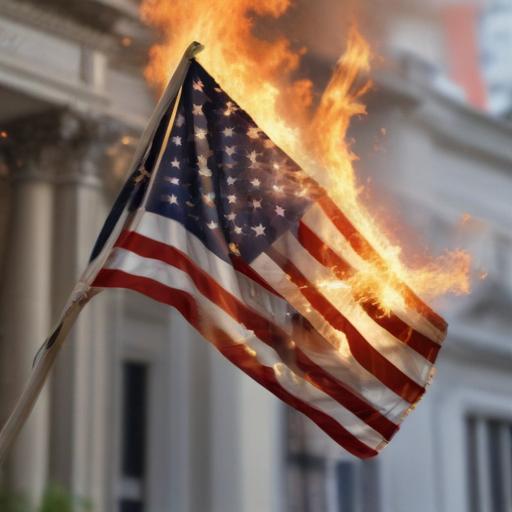Two misdemeanor charges have been filed in federal court in Washington, D.C., against Jan Carey, 54, of North Carolina, after he burned an American flag outside the White House earlier this week. The case arises as President Trump has ordered the Justice Department to investigate flag burning.
Carey faces two counts that are not tied to the act of burning the flag itself. One charge alleges he lit a fire “not in a designated area and receptacle,” and the other accuses him of lighting a fire “in a manner that threatened, caused damage to, and resulted in the burning of property, real property, and park resources.” Each misdemeanor carries potential penalties of a fine or up to six months in custody.
A video captured by WUSA9 shows Carey identifying himself as a military veteran and saying he was protesting the executive order. In an interview with the station, Carey said he “immediately thought I need to go burn a flag in front of the White House and let’s put this to the test.”
On Monday, President Trump signed an executive order directing the DOJ to pursue flag-burning cases, even as the Supreme Court’s 1989 ruling protected flag burning as symbolic speech under the First Amendment. The order aims to navigate around that precedent by urging prosecutors to focus on flag burnings that violate other content-neutral laws, and it suggests charges could be pursued if burning a flag is likely to incite imminent lawless action or constitutes “fighting words.”
Carey was not charged with incitement. CBS News reached out to Carey for comment.
What this means: The charges point to the use of non-speech-related statutes—such as arson or destruction of property—rather than First Amendment claims centered on symbolic speech. The Trump administration’s move to broaden potential prosecutions for flag burning continues to fuel a legal debate about how to balance free expression with laws governing property, safety, and public order. The outcome of this case could contribute to ongoing constitutional questions about the limits of flag symbolism in political protest.
Summary: Federal prosecutors in D.C. charged Jan Carey with two misdemeanors tied to the manner and location of the flag burn outside the White House, as the administration pushes a broader DOJ agenda on flag burning despite longstanding First Amendment protections. The case highlights the tension between symbolic speech and laws governing conduct in public spaces.
Additional context: The evolving legal landscape around flag burning remains a focal point in debates over free speech, government authority, and the role of the courts in interpreting constitutional rights. The decision on Carey’s case will hinge on how the federal statutes are applied in conjunction with established First Amendment limits.
